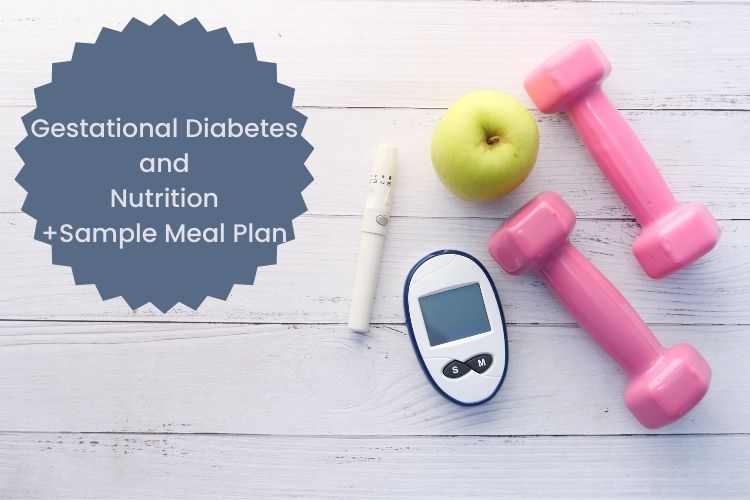Gestational Diabetes And Nutrition

What is GDM? How can we manage this?
Gestational diabetes(GDM) is a type of one of the most common complications of pregnancy. The American Diabetes Association defines gestational diabetes as “Diabetes diagnosed in 2rd or 3rd trimester of pregnancy”.
Normally, your body produces a hormone called insulin that helps your cells absorb glucose (sugar) from your bloodstream for energy.During pregnancy, your body makes other hormones that can make it harder for insulin to work effectively, leading to higher blood sugar levels.
Diagnosis usually happens after a routine prenatal glucose screening test between 24 and 28 weeks. They perform a 50-g glucose load test(nonfasting), then measure the plasma at 1 hr. If the plasma glucose level is higher than 140 mg/dL they would proceed with another test to confirm the GDM.
What are the symptoms of GDM?
Unfortunately, there are usually no noticeable symptoms in people with GDM. However, some women may experience increased thirst, frequent urination, tiredness, or unexplained weight loss.
What is the treatment of GDM?
GDM often disappears after delivery, however, it is important to follow the nutrition recommendations during and after the delivery.
-
Self-monitoring the glucose fasting/1-hr and 2-hr after eating
-
Slow weight gain and calorie restriction (if recommended)
-
Working with a Registered Dietitian can be especially helpful since Medical Nutrition Therapy is needed to manage diabetes to protect the baby and mothers.
-The American Diabetes Association recommends breastfeeding to decrease the risk of developing type-2 diabetes after childbirth. Some research shows that women who breastfed reduce the risk of diabetes by 40%. Another great reason to breastfeed if you can!
Nutrition:
-
Focus on balanced meals: Combine complex carbohydrates (whole grains, vegetables, fruits), lean protein, and healthy fats for sustained energy and blood sugar control.
-
Control portion sizes: Use smaller plates and measuring cups to prevent overeating.
-
Choose low-glycemic foods: These release sugar slowly into your bloodstream, preventing spikes. Examples include non-starchy vegetables, nuts, berries, and whole grains.
-
Limit high-glycemic foods: These quickly raise blood sugar and should be consumed in moderation or avoided. Examples include white bread, sugary drinks, candy, and white rice.
-
Spread out your meals and snacks: Aim for 3 meals and 3-4 snacks throughout the day to prevent blood sugar drops.
-
Stay hydrated: Drink plenty of water throughout the day to help regulate blood sugar and prevent dehydration.
-
Read food labels: Pay attention to carbohydrates and sugar content, choosing options with less added sugar.
-
Consult a registered dietitian: They can create a personalized meal plan based on your individual needs and preferences. If you need assistance or have concerns about meal plan, schedule a discovery call with me so I can help you!
Sample Meal Ideas:
Breakfast:
- Greek yogurt with berries and chia seeds
- Whole-wheat toast with avocado and egg
- Oatmeal with nuts and fruit
- Scrambled tofu with whole-wheat toast and vegetables
Lunch:
- Grilled chicken salad with mixed greens, quinoa, and vinaigrette
- Tuna salad sandwich on whole-wheat bread with lettuce and tomato
- Lentil soup with whole-wheat bread
- Veggie burger on a whole-wheat bun with salad
Dinner:
- Salmon with roasted vegetables and brown rice
- Chicken stir-fry with brown rice and vegetables
- Lentil bolognese with whole-wheat pasta
- Vegetarian chili with whole-grain bread
Snacks:
- Apple slices with nut butter
- Greek yogurt with fruit and granola
- Carrot sticks with hummus
- Hard-boiled egg
- Cottage cheese with sliced vegetables
Remember: These are just suggestions, and you can adapt them to your preferences and dietary needs.
Don’t be afraid to experiment and find what works best for you.
Monitor your blood sugar regularly and adjust your diet as needed.
Enjoy your meals and focus on making healthy choices that nourish your body and your baby.
Additional Resources:
- American Diabetes Association: https://diabetes.org/
- American College of Obstetricians and Gynecologists: https://annualmeeting.acog.org/
- National Institute of Diabetes and Digestive and Kidney Diseases: https://www.niddk.nih.gov/health-information/diabetes
This blog provides general information and discussions about health and related subjects. The information in this or other posts are not intended to give you medical advice or should not be substituted with medical advice. Please see your health care provider for individualized treatment plans and recommendations.
I hope this helps you navigate your gestational diabetes journey through food! Feel free to reach out if you need help with managing your diabetes!
If you are expecting, feel free to join my FB group where we share our current and previous experiences with other mom-to-be’s!
Stay healthy and shine with your baby!
Love,
DNY
Let’s connect: Instagram @dietitianny; Twitter @dietitianny; Facebook @MerveCiray
 Subscribe to receive my FREE Nutrition for Eating Out Guide!
Subscribe to receive my FREE Nutrition for Eating Out Guide!